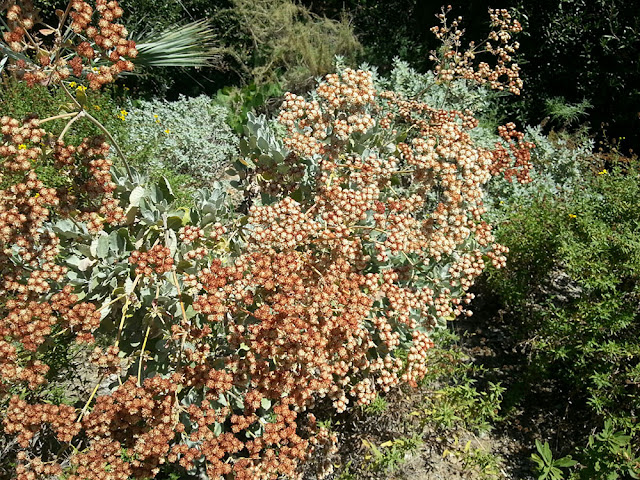Very rarely does my day job and my interest in nature cross
paths. I'm working on the installation of a garden that took me to the magical
place that is Tree of Life. The nursery is known for California natives,
specifically Orange County natives.
It is located at one of the most southern points of Orange
County, inland, and is at the foot of the Cleveland National Forest is San Juan
Capistrano. It is a few miles away from a suburban sprawl but the staff still
say they have to go into town like it's a rural area. When you turn in off the
winding two lane road you are met with a dirt road.
Walking up to the first building called Casa La Paz, or
house of peace, you truly enter a sanctuary. A large tree and canopy provides
shade in front of Casa La Paz where there is a display of various plants on
wood tables or in the ground. Inside Casa La Paz are books on plants,
landscapes, birds, nature and hiking.
The true beauty is found on the shelves and shelves of
outdoor plants. Many people believe that to have a drought tolerant and native
garden in Southern California it means desert plants. They are far from the
truth. Southern California's climate is actually Mediterranean, which means
beautiful flowering plants in purples, yellows and pinks, wispy grasses and
some succulents. All which I found at Tree of Life.
The pollinator and butterfly garden area was my absolute
favorite. Besides the various types of bees flying around, I saw at least 6
varieties of butterflies all of different sizes and colors. There were these
quarter sized yellow flowers that looked like they were made of tissue paper.
Their petals were crinkled, but were the brightest yellow I've ever seen in
nature. The bees loved them.
I fell in love with the yarrow. It looks so much like wild
carrots with long leaves and the tiniest white flowers. It is also known as
plumajillo which means little feather in Spanish, which is absolutely true. There
is a variety called Paprika that is red and yellow, though I find the white
feather plant to be more beautiful and true to nature. It can be used to make
tea, tinctures and salves for healing cuts. It is also edible and can be eaten
as a leafy vegetable. I regret not bringing home a few with me.
Being shown plants that can replace turf and can even
sometimes be mowed was amazing. The Melica imperfecta was a beautiful grass
that is actually native to Anaheim, and it was gorgeous.
On the way out I got to see Queen Anne's lace for the first
time. I always expected it to be white, but it had this reddish brown tint to
it. Almost like it was vintage lace. Next to it was a Bay Tree. I plucked a
leaf and gave it a rub and the smell reminded me of Italian food. The canopy
was huge. There were two Manzanita trees
next to it, and the difference between the red and green of the two trees was
so stark.
I cannot wait to return to Casa de Paz and its colorful
garden. Next time it might be a leisure trip since I heard there is great
hiking in the area and a small roadside cafe with a 360 degree view. I am
thankful to be working on a project that led me to this magical place.









No comments:
Post a Comment
Thanks for stopping by and chatting!